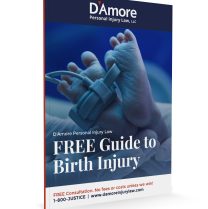D'Amore Personal Injury Law, LLC
Serious Injury Lawyers Proudly Serving
Baltimore, Annapolis, & Washington, D.C.
Chorioamnionitis
What is Chorioamnionitis?
A bacterial infection known as chorioamnionitis can develop prior to or during labor. The “chorion” (outer membrane) and the “amnion,” which surround the fetus, are referenced in the name (fluid-filled sac). Bacteria infecting the chorion, amnion, and amniotic fluid around the fetus causes the condition. Chorioamnionitis is a frequently overlooked infection that can happen before or during labor. Even though it is treatable, if this condition is not correctly identified while a woman is pregnant, it could cause catastrophic injury, or even be fatal for your baby.
Chorioamnionitis is an infection of the amniotic fluid, the membranes encircling the fetus, the uterine walls, the placenta, or a combination of these caused by inflammation or bacteria. Often, this infection begins in the mother’s vagina. Despite some pregnant women with this infection exhibiting no symptoms at all, the complications and harm brought on by this infection can be extremely severe.
What are the Effects of Chorioamnionitis on You and your Baby?
Fetal death, neonatal intensive care unit admission, persistent lung diseases, cerebral palsy, hypoxic-ischemic encephalopathy, periventricular leukomalacia (PVL), hemorrhage, postpartum endometritis, and sepsis can all be brought on by chorioamnionitis and a lack of prompt treatment.
What are the Effects of Chorioamnionitis on You and your Baby?
As mentioned before, some women experience no symptoms at all. Here are some of the most common symptoms in cases of chorioamnionitis:
- Fever (this is the most important clinical sign of the infection)
- Diaphoresis (excessive sweating)
- Hypotension (low blood pressure)
- Uterine sensitivity
- Maternal tachycardia (heart rate greater than 120 beats per minute).
- Fetal tachycardia (heartbeats greater than 160 bpm)
- Vaginal discharge or amniotic fluid that is purulent or smells bad
- Maternal Leukocytosis (high white blood cell count)
Microbiological indications in an amniotic fluid culture, maternal fever, or microscopic anomalies in the placenta and umbilical cord may all be used to identify chorioamnionitis.
Since access to uncontaminated amniotic fluid or the placenta for culture is intrusive and normally avoided, chorioamnionitis diagnoses are typically made entirely based on clinical (observed) findings. Diagnostic criteria often include uterine discomfort, maternal or fetal tachycardia, and foul or purulent amniotic fluid, in addition to a fever (temperature greater than 100.4 degrees Fahrenheit).

How is Chorioamnionitis Treated?
The severity of the infection, the mother’s age and health, and the symptoms all affect how chorioamnionitis is treated. The administration of antibiotics begins immediately and may continue even after birth.
Early initiation of antibiotic therapy reduces the baby’s risk of developing a serious infection. Among the risks are neonatal bacteremia (bacteria in the bloodstream), pneumonia, sepsis, and mortality. Additionally, receiving antibiotic treatment reduces the likelihood of maternal problems and the length of hospital stay.
Gentamicin and aminopenicillin are the medications most frequently combined to treat the infection. In addition, Cleocin (clindamycin) or Flagyl (metronidazole) are added when a Cesarean section is necessary.
Medical Malpractice Claims
Doctors must be able to diagnose and treat chorioamnionitis quickly to avoid adverse outcomes for the mother and the newborn. Likewise, neonatal caregivers must be prepared to treat the fetus with antibiotics as soon as the infection is found and act swiftly to save both lives. Chorioamnionitis infections that affect the pregnant woman or her unborn child but are not diagnosed, are not treated, or are handled improperly may give rise to a malpractice claim.
Learn more about what to do after a Birth Injury in our FREE guide.

Birth Injury Attorneys in Maryland and Washington, D.C.
If you or your baby were harmed during your pregnancy or delivery, you may have a case for medical malpractice. The skilled attorneys at D’Amore Personal Injury Law will provide you with a free evaluation of your case and advise you of your legal rights. There are never any out-of-pocket costs to you unless they win your case. Reach out today at 410-324-2000 to schedule a free consultation.
RELATED ARTICLES
FREE Case Consultation
Fill out the form below and we will contact you.
Or, give us a call at

